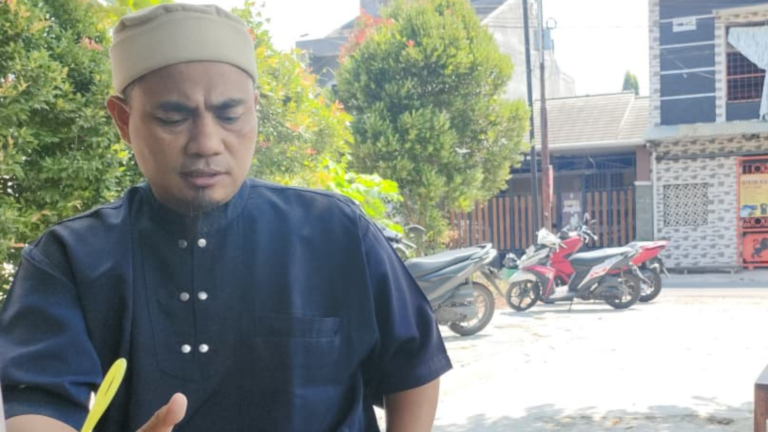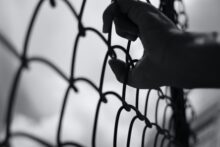Jack Harun’s Turning Point, from the Bali Bombing to Building Peace

Joko Tri Harmanto, better known as Jack Harun, a former terrorist convict involved in the 2002 Bali Bombing I, shared how he was drawn into a radical network and later found his way back to society.
Jack Harun was exposed to radical ideology as early as junior high school. At the time, the Bosnian conflict and the controversy over Soeharto’s single ideology policy became the entry points to his ideological journey.
“When I was in junior high school, I saw leaflets about Bosnia. As a muslim, my heart was moved. But since I was just a village boy, it stopped at sympathy. When I entered high school, an older student who had joined NII (Negara Islam Indonesia – Indonesia Islamic State) began to mentor me,” he recalled during an interview with The Apex Chronicles on Monday (30/9).
Born in Wanagiri hamlet, Jatirejo village, Lendah district, Kulon Progo regency, Yogyakarta, Jack said that during high school, he and about 12 friends pledged allegiance to NII. Over time, he became involved in various group activities, including fundraising and regular meetings.
“The doctrine back then was that Indonesia was not Islamic state, so we had to join an Islamic organization considered kaffah (complete). There were weekly meetings, mandatory infaq contributions, and further indoctrination. I thought that was the ultimate truth I had been seeking,” he said.
Upon entering university in Surakarta, Jack Harun volunteered in the Ambon and Poso conflicts. He had been part of a terrorist network since 1999, operating in those regions.
At the peak of his involvement, in 2002 he served as a timer and bomb assembler for the Bali Bombing I in Legian, Kuta, Bali. As a student of Dr Azahari and Noordin M Top, Jack was responsible for determining when the bomb would be detonated.
His journey ended when he was arrested for his role in the Bali bombing.
“When I was arrested, the police found bullet remnants in my mother’s house. Seeing my mother cry was my turning point. I realized I had to stop,” Jack admitted.
While serving his sentence in Cipinang prison, his mindset began to change. Support from his family, especially his mother and wife, strengthened his resolve to reform.
“I was sentenced to six years, served four and a half. From the start, I wanted to change, so I joined the prison rehabilitation program willingly,” he said.
Challenges and Stigma
In 2008, Jack Harun was released from prison. Although determined to start anew, he faced major challenges from two sides, his former group and public stigma.
“The first challenge came from the group, they spread negative narratives. The second came from society, there was a stigma. Even my wife and child were affected. It was a heavy burden,” he explained.
Jack chose to respond by demonstrating positive change. He opened a soto (traditional soup) stall, even offering free meals every Friday. His life transformed, from a bomb maker to a Soto maker.
“My goal was to create a positive narrative, that a former terrorist convict can do good. I join community work events. I want to appear better than the average person,” he said.
He emphasized that community acceptance is strongly influenced by local leaders. Jack approached neighborhood heads (RT and RW) to explain his sincere intention to reintegrate.
“I told them I wanted to bury my past. I returned to society for good. That helped reduce the stigma,” he concluded.
For more than five years, Jack has been running his Soto business. Recently, he officially earned a Master’s degree in Pancasila Education from Sebelas Maret University (UNS), graduating on Saturday, April 19, 2025.
Jack’s return to the Republic of Indonesia reflects the success of Indonesia’s deradicalization and rehabilitation programs.
Terrorism observer Sofyan Tsauri said that Indonesia’s deradicalization and rehabilitation programs have shown significant results, evidenced by the absence of terrorist attacks in 2022 and 2023.
“In my view, that’s remarkable. We had zero attacks in 2022 and 2023, that’s a major achievement for Indonesia,” Sofyan noted.
However, he cautioned that Indonesia cannot claim to be completely free from terrorism. “But in terms of management, Indonesia is among the best in the world,” he said.
Sofyan highlighted Indonesia’s transparency in legal proceedings as a key strength compared to other countries.
“Indonesia is open, the media can access trials, investigation reports, and motives. Even the press can directly observe the process. In the U.S., it’s not necessarily that transparent. This makes Indonesia one of the best examples globally in handling terrorism cases,” he added.
According to Sofyan, the factors that lead someone to terrorism are complex and multifaceted.
“If we talk about education, there are smart people who become terrorists. If we talk about the economy, there are also rich ones. So it’s a mix of factors. As long as the government ensures people aren’t hungry, safe, and prosperous, the space for terrorism will close,” he emphasized.
Still, he noted that there are vulnerabilities within Indonesian society that can lead people astray, but these can be addressed through justice and welfare.
“If the government fails to provide welfare and security, extremism can take root again,” he warned.
Holistic Rehabilitation and Family Support
The deradicalization process for former terrorism convicts is not easy. Kristin Yuniastuti, a senior probation officer at Surakarta Probation Center (Bapas), explained that deradicalization targets not only individuals but also their families.
“each officer uses a different approach. I focus not just on the former convict but also their spouse and children, because they are crucial to the transformation process,” Kristin said.
The process begins with a social investigation (Litmas) proposed by the prison. The probation office then assesses the family’s needs.
“Usually, the guarantor is the wife. From the assessment, we find out what the husband plans to do after release, whether the children need scholarships, and so on. Everything is mapped out early,” she explained.
Kristin has built a network with over 20 institutions, both national and international.
“From international NGOs to state-owned enterprises (SOEs) like PLN, Jasa Raharja, Pegadaian, and the Ministry of Social Affairs, even local entrepreneurs in Solo, we involve everyone to help our clients,” she added.
The assistance provided varies, from business capital for former convicts, to business certification for their wives, and even household electrification.
“Once, there was a family whose electricity was borrowed from their parent’s house, only 450 watts and only on at night. We proposed assistance to PLN, and now they have their 900-watt connection,” Kristin said.
Some clients now run small food businesses and earn a decent income. “One told me he makes IDR 150,000 – 300,000 a day in profit. That’s a big improvement,” she noted.
Children of former convicts also receive educational scholarships, with 68 beneficiaries across Indonesia supported through partnerships with educational foundations.
Deradicalization also touches on ideological transformation. Kristin emphasized that mindset change cannot happen overnight, but it can be achieved through literacy and dialogue programs.
“There used to be a moderation literacy program in Solo, facilitated by an NGO. Former convicts were introduced to general readings, engaged in discussions with respected clerics, and learned about tolerance. It proved effective,” she said.
The change was clear, those who once labeled others as infidels became more open and accepting. That’s a remarkable transformation,” she added.
Currently, Bapas Surakarta supervises around 60 former terrorism convicts, and Kristin personally handles more than 10 in the aftercare state, a follow up guidance phase after reintegration.
“Aftercare is voluntary. The former convict applies for continued guidance, and if approved, a decree is issued by the head of Bapas. The mentoring lasts six months and can be extended,” she explained.
However, she admitted facing challenges when clients from outside Solo requested her supervision. “I can’t, because of jurisdiction rules. But they trust me after seeing successful cases I’ve handled,” she said.
Kristin stressed that deradicalization must be comprehensive and continuous.
“There should be a national forum for probation officers so that successful practices can be shared. Otherwise, many will flock to Solo for help, when similar efforts could be replicated elsewhere,” she explained.
For Kristin, deradicalization is not only about changing ideology, it’s about ensuring that former convicts and their families have a better future.



